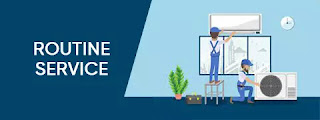AC Repair: A Complete Guide
It can be annoying when your air conditioner breaks down on a sweltering summer day. For your house to remain cool and cozy, AC maintenance is necessary. We'll go over typical AC issues, how to troubleshoot them, how much repairs cost, and when to hire a pro in this guide.
Why AC Repair is Important
A properly operating air conditioner lowers humidity, increases comfort, and improves indoor air quality. It can also last longer and use less energy if you don't fix small problems, which can result in costly repairs or even a replacement.
Common AC Problems and How to Fix Them
1. AC Not Turning On
Possible Causes:
Tripped circuit breaker
Faulty thermostat
Blown fuse
Solution:
Look for tripped breakers on your electrical panel and reset them.
Make sure the temperature is below room temperature and that your thermostat is in "cool" mode.
If necessary, replace blown fuses or contact an electrician.
2. Warm Air Blown by the AC
Possible Causes:
Dirty air filter
Low refrigerant levels
Frozen evaporator coil
Solution :
Every one to three months, change or clean the air filter.
To have the refrigerant inspected and refilled, contact a professional if you suspect a leak.
To allow frozen coils to defrost, turn off your air conditioner for a few hours.
3. Odd Noises Coming From the AC
Possible Causes:
Broken or loose parts
debris within the apparatus
Compressor or motor problems
Solution:
Tighten any nuts or screws that are loose.
Clear the outdoor unit of debris.
If the noises are continuous, call an HVAC specialist.
4. Water Leakage from the AC
Possible Causes:
blocked drain pipe
Evaporator coil frozen
Unclean air filter
Solution:
Use a wet/dry vacuum to clear the drain line.
Before restarting the device, let the frozen coils to thaw.
Air filters should be changed frequently.
5. AC Short Cycling (Repeatedly Turning On and Off)
Possible Causes:
Condenser coils that are dirty
Large AC unit
Problems with the location of the thermostat
Solution:
Enhance airflow by cleaning the condenser coils.
To find out if your air conditioner is the proper size, speak with an HVAC specialist.
Avoid placing the thermostat near heat sources or direct sunlight.
Tips for Do-It-Yourself AC Maintenance
You may avoid expensive AC problems by doing preventative maintenance. Here are a few easy pointers:
To increase efficiency, replace air filters on a regular basis.
Clear the outdoor unit of trash, dirt, and leaves to keep it clean.
Check for potential leaks in the refrigerant levels.
To prevent short circuits, inspect and tighten electrical connections.
To maintain your system in optimal condition, schedule yearly expert maintenance.
When to Contact a Skilled AC Repair Company
While basic AC problems can be resolved with do-it-yourself troubleshooting, major issues call for professional assistance:
Refrigerant leaks: Refilling refrigerant requires only qualified experts.
Electrical problems: Dangerous wiring can occur.
Compressor failure: The compressor may need to be replaced if your air conditioner isn't cooling at all.
Odd smells: An electrical issue may be indicated by a burning smell.
Employing an HVAC specialist guarantees accurate evaluation and remedies, halting more harm.
Cost Breakdown for AC Repair
The location and nature of the problem determine how much AC repair will cost. An estimate of typical repairs in the United States is as follows:
How to Choose the Right AC Repair Company
Verify the company's licensure and certifications to make sure its technicians are NATE and EPA qualified.
Examine client testimonials: Seek out favorable reviews and high ratings.
Obtain several quotes: Prior to selecting a service, compare costs.
Inquire about warranties: Reputable businesses provide service assurances.
Conclusion
Maintaining a comfortable and energy-efficient home requires AC repair. You may save time and money by preventing serious malfunctions with routine maintenance. Try troubleshooting basic problems first if your air conditioner isn't working properly, but don't be afraid to seek a professional for more complicated repairs.
Top 5 FAQs About AC Repair
1. How often should I service my AC?
You should schedule professional maintenance at least once a year, ideally before summer.
2. Why does my AC smell bad?
A musty smell indicates mold buildup, while a burning smell could mean an electrical issue. Clean or replace air filters and call a technician if needed.
3. How long do AC units last?
Most air conditioners last 10–15 years with proper maintenance.
4. Can I recharge my AC refrigerant myself?
No, handling refrigerants requires special certification. Always hire a professional.
5. What should I do if my AC keeps tripping the breaker?
This could be due to an overloaded circuit, faulty wiring, or a compressor issue. Contact an electrician or HVAC technician for assistance.







Post a Comment